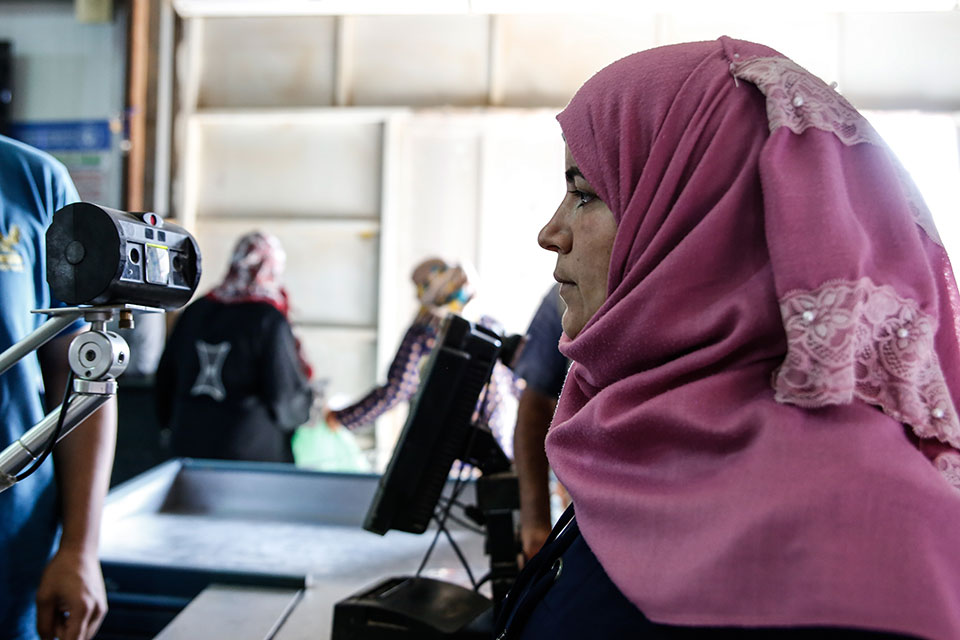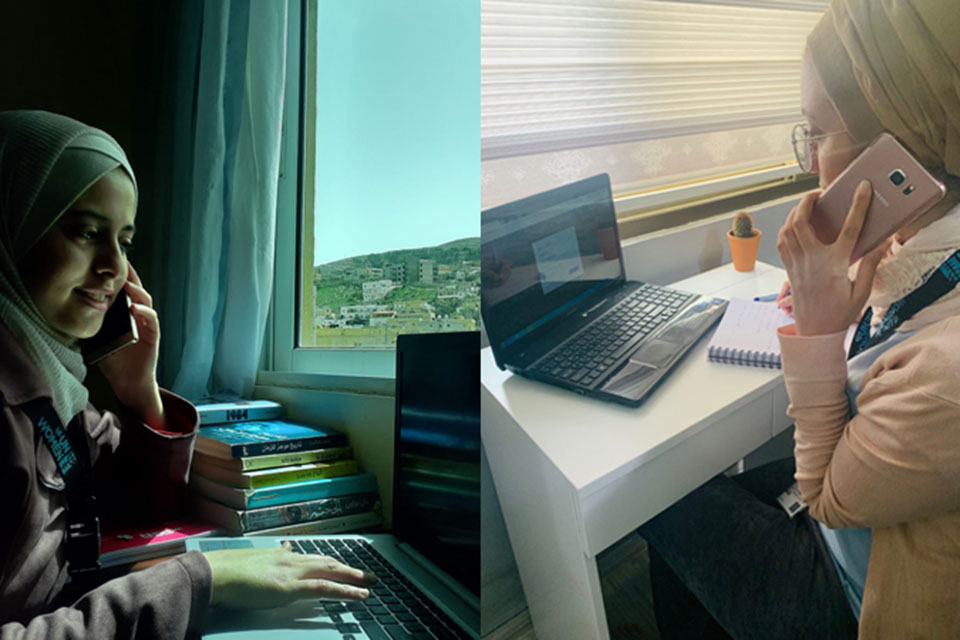Using technology to assist vulnerable Syrian refugees during COVID-19 lockdown
Amid the coronavirus pandemic and the social distancing measures, UN Women is providing urgent support, information and essential services to more than 5,700 Syrian refugees in Za’atari and Azraq refugee camps.Date:
Originally published on UN Women Jordan’s website
In the Za’atari and Azraq refugee camps in Jordan, a curfew is in place from 6 p.m. to 10 a.m.. Even during the day regulations are in place: people must stay indoors, unless they have to buy food or seek medical help. Only a few essential services, such as hospitals, clinics and supermarkets, remain open.
Even the movement of UN staff has been restricted, complicating the work of reaching the people who need it most. But UN Women’s innovative blockchain cash-disbursement system has proven to be a reliable and resilient system, because it can be managed remotely. As a result, UN Women is one of the agencies in Jordan that has been able to seamlessly and remotely ensure cash continues to reach 213 Syrian refugee women involved in its cash-for-work programmes at the Oases women’s empowerment centres in the camps.

Work is scarce as many workplaces remain closed during the lockdown.UN Women beneficiaries however, continue to receive their salaries at World Food Programme-run supermarkets, which remain open and where iris-scanning technology identifies and links to each woman’s account on UN Women’s blockchain. Women can choose to save their money, receive cash-back, or purchase food and essential supplies. The IrisGuard system involves no physical contact and beneficiaries need not touch any buttons, making it a safer and more hygienic method.
UN Women is also using WhatsApp to disseminate reliable information on COVID-19 prevention and services made available by the Government and WHO. As many beneficiaries are also community mobilizers, they’ve created their own WhatsApp groups to reach out to other women to disseminate information on how to protect themselves from the virus and safely care for family that may fall ill.
“At first, I was skeptical about these messaging groups,” admits Ghodoun Mohammed Daeef, 27-year-old Syrian refugee enrolled at the UN Women Oasis Centre at the Azraq refugee camp. “Then, I realized the importance of such information, and I started to spread the messages with my own friends and neighbours within the camp,” she says. “In a way, this situation helped me realize that I could help other refugees like me.”
Mohammed Daeef is among the 300 women refugees using the daily WhatsApp messaging groups.

School closures and the shift to the Government’s e-learning platform have created additional challenges for students and families. In response, UN Women has increased the number of teaching assistants in cash-for-work positions to provide remote support with the online curriculum being delivered by the Ministry of Education.
Nahid Ali Albuhair, 31, is a Syrian refugee teaching assistant at the UN Women Oasis in Za'atari who has been providing Arabic literacy classes, using her caravan wall as a canvas for her lessons and disseminating video-based lessons to parents throughout the lockdown.
The camps are home to 113,035 refugees, who now spend most of the day in their caravans – one-room, prefabricated housing units for entire families, measuring 16 by 9.5 feet.
In many parts of the world, the increased isolation, added financial stress and anxiety caused by the pandemic and lockdowns have exacerbated existing problems such as gender-based violence.
Since the COVID-19 outbreak began, four UN Women field staff have been on the front lines of prevention, proactively undertaking sometimes more than 100 calls on a daily basis to provide information, counselling and psychosocial support to vulnerable Syrian refugee women in the camps, via phone and WhatsApp.
“At this critical time, we have scaled up our efforts to assist women facing protection issues, providing dedicated counselling, essential referrals to medical partners and shelters, and preparing safety plans,” explains Yafa Jaffal, UN Women Protection Assistant. Safety plans often involve helping women compile a list of trusted family members, friends or protection workers they can reach out to, if the abuse happens again or escalates, and discussing positive coping mechanisms.
UN Women has also equipped all its Oasis centres with additional sanitization materials and partnered with UNICEF to distribute its stockpile of nearly 1,000 baby kits made by Syrian refugee women in UN Women Oases to the families of all newborns in the camps.
UN Women’s work in the refugee camps is funded by the Governments of Australia, Canada, Finland, France, Japan, Iceland, Italy, Zonta International Foundation, the EU Regional Trust Fund in response to the Syrian Crisis (the"Madad Fund”) and UN Women National Committees.